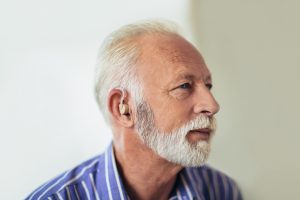
But even slight hearing loss may lead to sharp cognitive decline.
Age-related hearing loss is one of the most common health disorders associated with aging, but most people think little of it. They often ignore the trouble that’s potentially leading them down a dangerous and lonely path.
A 2019 study found even a 10-decibel (dB) decrease in hearing was associated with a significant decrease in cognitive ability.
The problem is that most doctors don’t consider hearing loss until a person has a hard time hearing a person whisper (about 25 dB). Significant cognitive decline may have already occurred by then.
The study found that early hearing impairment by only a small amount could lead to a steep decline that is likely to worsen as hearing loss accelerates.
Hearing is critical to cognition and dementia risk because it keeps people engaged. When individuals struggle to hear, it is very easy to self-isolate, become depressed, and shy away from others. Poor hearing can lead to fewer valuable interactions.
A lack of substantive conversations might lead to further cognitive decline and increase the risk for various forms of dementia, including Alzheimer’s disease.
The only way to slow hearing loss is through fast-acting treatment. That means visiting a hearing specialist to be fitted for a hearing aid. Once hearing is lost, it cannot be restored without an aid.
You can also try to preserve ear health by taking care of your ears. An ear-health routine includes eating a variety of nutrient and antioxidant-rich fruits and vegetables; listening to music at a reasonable level, and doing your best to shield yourself from loud, outdoor noise.
Booking a doctor’s appointment is a good idea if you’ve noticed even a slight dip in your ability to hear. It could help stop the march into cognitive decline and offer protection from dementia.